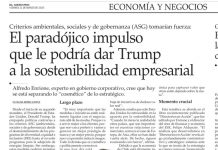Fuente: Ethical Boardroom
 Autor: Martine Valcin, Global Manager, Corporate Governance / ESG Advisory, Knowledge and Learning in the ESG Advice and Solutions Department at International Finance Corporation (IFC)
Autor: Martine Valcin, Global Manager, Corporate Governance / ESG Advisory, Knowledge and Learning in the ESG Advice and Solutions Department at International Finance Corporation (IFC)
The Covid-19 pandemic exposed the fragility and vulnerability of the corporate sector, accelerating the push to adopt sustainable business models that are increasingly demanded by investors and consumers alike. Both the arrival and the impact of Covid-19 were sudden and unexpected. In a matter of weeks, the global pandemic shuttered businesses and industries, closed economies, and devastated global trade – among countless other consequences.
It was inevitable that such a catastrophic event, and its cascading impact, would also significantly alter our perceptions about ourselves, our institutions, and our economies. Similarly, the crisis heightened concerns and questions about the vulnerability of the companies and institutions we rely on, hastening the call for private sector resiliency.
There are beneficial consequences to such difficult questions. Most important, perhaps, are the questions the current crisis has raised about how companies can withstand future crises, including – but certainly not limited to – the impacts of climate change. These questions have important repercussions for corporate boards going forward.
Even before the Covid-19 pandemic, companies and their boards had begun to reevaluate their roles and responsibilities, slowly but surely shifting from the tunnel vision of short-term shareholder value toward a more comprehensive, 360-degree view of all stakeholders, including shareholders, employees, customers, suppliers, and the communities in which these companies operate – not to mention the future generations that deserve to inherit a clean and stable environment. Harvard Business Review calls this a transition from ‘shareholder capitalism to stakeholder capitalism’.[1]
While such changes to long-held corporate attitudes were incremental prior to Covid-19, the pandemic has acted as a catalyst to accelerating the idea that companies must embrace sustainable business practices – taking into account their responsibilities to all stakeholders – if they are to be resilient in a global environment.
Changing attitudes toward sustainability have moved consumers and investors alike to embrace brands and companies that adopt sustainable practices – and to avoid those that don’t. And this increased appetite for sustainable businesses and products during the pandemic is not merely anecdotal or speculative. The data bears it out.
Two-thirds of European apparel and footwear consumers surveyed by McKinsey said the crisis has increased the importance they place on limiting climate change, and that their expectations of the brands they purchase are dominated by social and environmental responsibilities, including a company’s environmental impact and its attention to the welfare of its employees and factory workers.[2]
According to a recent BCG survey, nine out of 10 global consumers said they were equally or more concerned about environmental issues in the wake of the pandemic, and nearly a third said they were now more convinced that their personal actions – including their consumption habits – can reduce waste, tackle climate change, and protect wildlife and biodiversity.[3] Clearly, sustainability is a growing concern for consumers.
Investors, too, are flocking to sustainable companies. Inflows to environmental, social, and governance (ESG) investing products soared in 2020. Funds that invest in or adopt strategies related to clean energy, climate change, and ESG increased their assets under management by 32 per cent in 2020, to a record $1.82trillion, according to data compiled by Bloomberg.[4] New investments in ESG funds could rise to $20trillion over the next two decades, US Trust predicts.[5]
And sustainable investments are outperforming their non-sustainable counterparts. The FTSE index of environmentally friendly equities is up 35 per cent in 2020, more than 20 percentage points above global equity indices.[6] ESG investment outperformance is just as prominent in emerging markets, where the MSCI Emerging Markets ESG Leaders Index has outperformed the broader MSCI EM Index by a considerable margin since 2008.[7]
“THE COVID-19 CRISIS HAS ACCELERATED AND STRESS-TESTED THE WAYS THAT SOUND ESG PRACTICES CAN CONTRIBUTE TO BUSINESS RESILIENCE, TURNING WHAT WAS ONCE CONSIDERED A CORPORATE ‘LIKE TO HAVE’ INTO A BUSINESS OPPORTUNITY – ONE THAT COMPANIES CAN NO LONGER AFFORD TO IGNORE.”
BlackRock, the world’s largest asset manager, with approximately $8.6trillion in assets under management, has established a correlation between a company’s adoption of sustainable practices and factors such as quality and low volatility, both of which bolster a company’s resilience.[8] According to BlackRock: “Companies managed with a focus on sustainability should be better positioned versus their less sustainable peers to weather adverse conditions while still benefitting from positive market environments.”[9]
BlackRock is not unique in its belief that better ESG performance makes for better long-term financial returns. A 2019 Harvard Business Review survey of 70 senior executives at 43 global investing firms and asset managers found that ESG was ‘almost universally top of mind for these executives’.[10]
These institutional investors and pension funds ‘have grown too large to diversify away from systemic risks’, wrote the study’s authors, ‘forcing them to consider the environmental and social impact of their portfolios’.
Embracing good ESG practices is now considered essential to mitigating risk. Two years ago, IFC revised its corporate governance methodology to facilitate the assessment of ESG issues of the companies in which we invest in an integrated fashion.
This updated methodology allows us to assess board oversight of ESG issues through parameters such as corporate commitment, the structure and functioning of the board, the control environment, disclosure and transparency, and the governance of stakeholder engagement.
One effective tool to help boards balance the needs of all stakeholders is the statement of purpose. This concise document – typically a page in length – can allow the board to clearly communicate the issues that are material to the company’s various stakeholders.
The statement of purpose should articulate the company’s purpose and commitment – to customers, employees, suppliers, and the community – and how it plans to harmonise commercial success with social accountability and responsibility. And it should identify the factors that are most critical to long-term value creation and sustainability, with a framework to integrate ESG issues into the company’s strategy, culture, and risk management.
According to a May 2020 Harvard Law School Forum on Corporate Governance: “Consensus is emerging that society and diversified investors are best served by companies that focus on sustainable value creation and respect the legitimate interests of all stakeholders, not just stockholders.”[11]
To keep the statement of purpose relevant and the board accountable to it, disclosure and transparency about ESG performance are essential. Consistent with the idea that sustainability is critical to long-term profitability, academic studies have found a strong link between ESG reporting and financial performance.-[12]
In addition, diversity at both the board and the senior management level is critical to good ESG practice and performance. There is a growing body of evidence linking gender-diverse boards and leadership to better company performance, as well as to stronger environmental, social and governance standards.[13] More inclusive and diverse boards and senior management are part of the solution to companies recognising their responsibilities to all stakeholders.
The Covid-19 crisis has accelerated and stress-tested the ways that sound ESG practices can contribute to business resilience, turning what was once considered a corporate ‘like to have’ into a business opportunity – one that companies can no longer afford to ignore. Boards will play a central role in navigating this transition, turning sustainable business practices into, simply, smart business practices
About The Author
Martine Valcin is the global manager, corporate governance / ESG advisory, knowledge and learning in the ESG Advice and Solutions department at International Finance Corporation (IFC). In her role, she is responsible for global corporate governance investment risk management, the delivery of ESG advisory solutions, knowledge support to IFC staff and clients on best-in-class ESG risk management as well as ESG-related technology and tools portfolio. She also leads ESG capacity building initiatives at a global level over a wide range of issues, such as disclosure and transparency, green finance, corporate governance for small-medium enterprises and women in business leadership.












